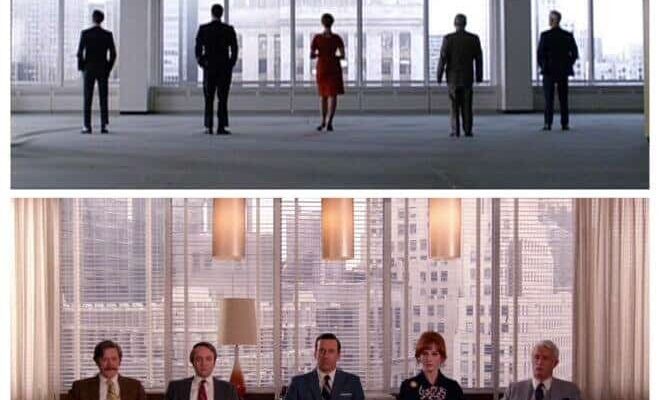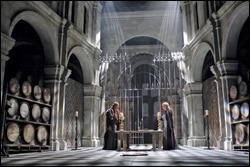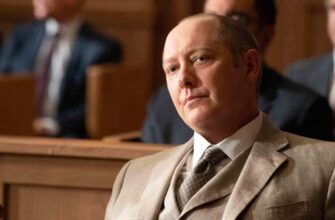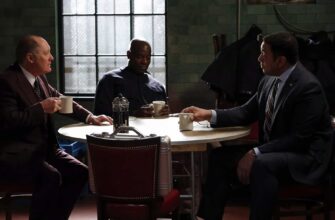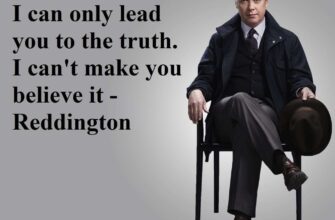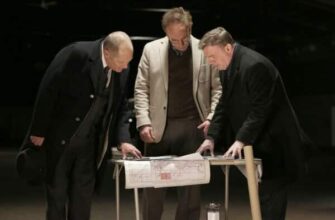Warning: Spoiler Alert
Attention Mad Men fans: all of the chirping about how Matthew Weiner’s been overseeing a final stretch that doesn’t feel like the endgame – well, he heard you! Episode 7.11, Time & Life, actually felt in many ways like a series finale – with three episodes behind it that didn’t carry much urgency and with three episodes still in front of it. Give the creative crew credit, they’re going out with one very unique sense of pace.
However, the strongest sense that Weiner had anticipated the way that fans would feel going into the “pivot” episode of the final seven actually came right before the start of the show. A Mad Men promo aired with the various actors talking about major plot points through the series and about how everything with the show always makes sense in retrospect. It would take a voice even more cynical than the one found in this corner to accuse Weiner of putting words in his actors’ mouths even outside of the show, but it was an interesting touch, however mischievous it may have seemed.
To the actors’ points about show logic, the dominant storyline of 7.11 sowed a seed that was planted in the midseason finale and followed up on hints that were dropped in the first three episodes of this half-season – hints that were noted in this very corner, it must be (immodestly) noted. Namely, the acquisition of Sterling Cooper & Partners by McCann Erickson in Episode 7.7, which was painted at the time as a panacea to block the machinations of Jim Cutler, was a disastrous miscalculation that would end up swallowing the vaunted agency whole. Now, one might argue that the breadcrumbs that were sprinkled in Episodes 7.8-7.10 contradict the picture that was painted at the end of 7.7, when objections to the deal were cast aside decisively and Don was left to survive in his agency after the threat of being purged. After all, weren’t Roger’s assurances of autonomy put in writing? If so, McCann Erickson must have delved deep into their supply of invisible ink, because at this point Sterling Cooper is helpless against anything that their new evil overlords have planned for them.
The callback to last year’s final episode wasn’t the only one, however, as one of the all-time classics, the Season 3 finale came into play with the same kind of caper overtones: trying to get clients to protect them against their own business consequences. But fittingly, for a show that’s about to go off the air permanently, the pattern wasn’t duplicated and the partners came up empty this time.
Everything starts when Roger learns that the lease for two floors at the Time-Life Building (hence, the episode name) has been allowed to expire in an apparent mistake. But this is no miscue: McCann is planning to move them all in, ostensibly to save on the rent. But the Sterling Cooper partners, who are trying half-heartedly to keep the secret (Pete clues in Peggy, who clues in Stan, while the secretaries are having their own little gossip circle about the matter), quickly realize the full implication: complete absorption into the corporate machine, the loss of their identity as a company and now being stuck completely under the thumb of their masters at McCann.
However, when Lou Avery’s goofy maneuvering actually lands Scout’s Honor a deal – in Tokyo, with the makers of Speed Racer, no less – that will take him away from the company’s West Coast office, Don spies an opportunity. He eyeballed California hungrily at the end of Season 6 and only Ted’s pathetic last-minute begging spree dislodged his commitment to move (ironically, Ted’s intention of rescuing his marriage with the move did not work and Don’s decision to stay in New York doomed what was left of his marriage). Now he sees another chance to make it work: if enough clients with McCann conflicts will “only agree to stay with a quasi-autonomous Sterling Cooper West Coast branch,” then McCann’s hand could conceivably be forced.
With Ken’s McCann conflict as a sticking point, Roger and Pete decide to see if their new tormentor will help them when push comes to shove. Just as he seems to indicate that he will, he demurs and walks out on them, leaving them scrambling. However, Pete’s 11th-hour arrangement with Secor Laxatives provides them with four accounts and $18 million in billings to plop down on the table during the fateful meeting. Don’s fanciful presentation is short-circuited by McCann head Jim Hobart, unsurprisingly so. How is a Don Draper pitch supposed to work on his peers in the advertising business, after all? Hobart tells them, “You won,” name-dropping major clients like a Big Pharma firm, Buick, Nabisco and Coca-Cola. And in terms of the level of business that they’ll be managing, the partners are all in the Big Time now (well, with the possible exception of Joan, who again wasn’t being given an indication of being taken seriously by McCann). But it’s at the expense of their company name and their own professional identities, which are intertwined with the lineage of Sterling Cooper.
The post-meeting drinking session is anything but celebratory, because they’ve been sucked into the pit that they so narrowly avoided in December of ’63. Oh, what a night, Don Draper. He does learn, before setting off to renew his quest for Diana, that Roger and Marie are indeed an item and he puts aside his cynicism about his former mother-in-law and congratulates Roger on his age-appropriate happiness. In searching for Diana, Don has little to go on, since she called his answering service twice and apparently thought better of leaving any contact information for him. He shows up at her old apartment only to find it being occupied by two gay guys now living there.
Absorption into McCann is unsettling for Pete, who’s never worked anywhere but Sterling Cooper. It accounts for a tremendous part of his identity, with his distant parents now gone and his ex-wife and daughter living in Connecticut. Speaking of them, Pete is summoned to a meeting at Greenwich Country Day with Trudy, where it is made clear to them that their daughter Tammy will not get off of the waiting list. Her test scores were low and, heartbreakingly, her absence of a real father figure manifested itself in an incomplete drawing that she furnished when asked to picture a man. However, the real breaking point for Tammy was the ancient McDonald/Campbell feud – apparently, the WASP preppy version of the Hatfields and McCoys – and the presence of a McDonald in the decision-making role at the school. Pete consoles himself by punching the jerk and later, Trudy confides that Tammy didn’t have a backup school because the man in charge of another one was hitting on her. That apparently has been happening a lot, since Trudy is pretty hot, albeit haughty and bossy.
It’s apparent that this matter is weighing on Pete as he addresses the OTHER woman to bring a Lil’ Petey into the world, namely, Peggy. He tells her about the McCann plan, figuring that she can get a start on job-searching, but her headhunter urges her to stick with McCann and she eventually seems inclined, as does Stan when she tells him. As this is unfolding, Peggy is interacting with children who are auditioning for commercial parts at the agency and Stan notices her stiffness with them, remarking “You hate kids.” But in the aftermath of a brutal argument between Peggy and the mother of one of the children about who was at fault when kiddo shot a staple into her hand, Peggy reveals to Stan the turmoil of putting Pete’s spawn up for adoption years earlier – although Pete’s name isn’t referenced. Stan sees this woman, always trying so hard to come across as professional and sufficiently steely, in a new light.
Just as the episode featured callbacks to epic moments of the past, so too does the ending of it reference the beginning. Inasmuch as the entire matter started with the questioning of company secretaries about why the rent wasn’t paid, worried chatter is running amok in their ranks and, predictably, Meredith is the one volatile enough to escalate into forcing a conversation with Don. He confirms the matter to her and assures her that she still has a job with him, but she resists his urge to brush off the matter from there, sensing disaster in the partners’ futile determination to keep the situation under wraps. For the first and probably only time in the series, Don recognizes Meredith as the adult voice of reason in a situation and he convinces Roger to convene all employees to unveil the move.
Roger’s announcement is an exact echo of the end of 7.7, when the acquisition by McCann was first put on the record. But here again, the comparison to an earlier moment is subverted, as his initial words are drowned out by employee chatter about the implications. Roger tries to regain their attention, to no avail. Harry Crane shouts that everything is going to be fine and is ignored by everyone, to the surprise of only Harry Crane. And then Don, the man who can command any room, calls out “This is the beginning of something, not the end!” His inability to refocus the employees is emblematic of the meta-reality: we know that this very well IS the end of something, nay everything in this on-camera world, after three more episodes. But at least now, everything is beginning to take shape. Last week, Don was forced to acknowledge his existential quest and the need to fill the void within, symbolized by his empty apartment, dead marriages and part-time fathering. This week, he found out that he actually did have one big thing left to lose, the company that he has essentially been the face of for well over a decade. His whimsical question to Roger “What’s in a name?” after the disastrous McCann meeting was a nod to his Dick Whitman past, which is known by only Roger and a few others. Don’s clearly pointed in a direction of big change as the final curtain readies to drop, but how he gets there in the final three episodes remains a massive mystery. Matthew Weiner wouldn’t have it any other way. But clearly, he also wants you to keep the faith that it’s all going to make sense. Let’s hope that it does.
